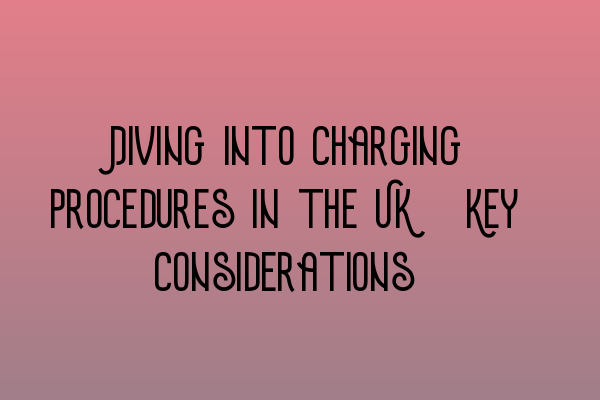Diving into Charging Procedures in the UK: Key Considerations
Welcome to SQE Criminal Law & Practice Law UK’s official blog! Today, we’ll be exploring the complex world of charging procedures in the UK and highlighting some key considerations to keep in mind. Whether you’re a solicitor, law student, or simply interested in the criminal justice system, this article will provide valuable insights into the charging process. So, let’s dive right in!
The Importance of Charging Procedures
Charging procedures play a crucial role in the UK criminal justice system. They determine the formal accusations brought against individuals suspected of committing a crime. Understanding these procedures is essential for anyone involved in criminal law, from law enforcement officers to defense attorneys.
One key consideration in charging procedures is ensuring the accuracy and adequacy of the charges filed. This ensures a fair trial and upholds the principles of justice. It’s important to thoroughly analyze the evidence and apply the relevant legislation to accurately charge an individual.
The Charging Process in the UK
In the UK, the charging process involves several steps. It typically begins with the initial arrest, followed by an investigation conducted by law enforcement officers. During this investigation, evidence is gathered to support or refute the allegations against the suspect.
Once the investigation is complete, the decision to charge an individual is made by the Crown Prosecution Service (CPS) in England and Wales, or the Procurator Fiscal in Scotland. This decision is based on the strength of the evidence and the public interest in pursuing a prosecution.
It’s crucial to note that the CPS operates under the Full Code Test, which requires that there is sufficient evidence to provide a realistic prospect of conviction and that it is in the public interest to proceed with the case. If these criteria are not met, the CPS may decide not to charge the individual.
Key Considerations in Charging Procedures
When navigating the charging procedures in the UK, there are several important factors to consider:
- Evidence: The strength and reliability of the evidence can significantly impact the decision to charge an individual. It’s essential to gather all relevant evidence and ensure its admissibility in court.
- Legislation: Understanding the applicable legislation is crucial for accurate and effective charging. Knowledge of relevant statutes, case law, and legal principles is essential in evaluating the allegations and drafting appropriate charges.
- Procedural Requirements: Proper adherence to procedural requirements is essential to ensure a fair and lawful charging process. Failing to comply with specific legal procedures may result in charges being dismissed or deemed invalid.
- Public Interest: The CPS places significant importance on the public interest when deciding whether to charge an individual. Factors such as the seriousness of the offense, the impact on victims, and the need to maintain public confidence in the justice system are considered.
- Defense Strategies: Anticipating possible defense strategies is vital in preparing robust charges. Considering potential weaknesses in the case and developing counterarguments can strengthen the overall prosecuting position.
While these are just a few key considerations, navigating charging procedures requires a comprehensive understanding of criminal law and the legal system as a whole.
Conclusion
Charging procedures in the UK are intricate and multifaceted. From gathering compelling evidence to considering the public interest, each step requires meticulous attention to detail and legal expertise. By understanding and embracing the complexities of charging procedures, legal professionals can effectively uphold justice and ensure a fair trial for all parties involved.
For more information and resources on criminal law and practice in the UK, check out our related articles:
